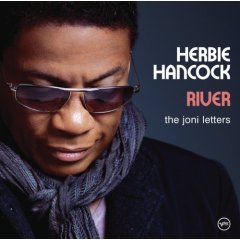Review by Brad Walseth
Tribute albums can be a mixed bag, veering between slavish devotion to the original that usually falls short of its inspiration, or reinvention that often ends up as parody. Fortunately, Herbie Hancock's recent paean to iconic songstress Joni Mitchell, "River: The Joni Letters," succeeds due to a combination of factors.
The strength of Mitchell's songwriting is first and paramount; her inventive guitar tuning techniques allowed her to move smoothly from folk into jazz into the '70s and they serve to set the table well here, while her penetrating lyrics are simply at a higher level and among the very best produced by any musical artist in any era.
A superb band, including singular bassist Dave Holland, drummer extraordinaire Vinnie Colaiuta and expressive West African guitarist Lionel Loueke here have coalesced into a uncommonly empathetic entity, adhering to the feel and overall structure of the material while imbuing the songs with subtle shades of their own unique musical personalities. And then there is the Wayne factor.
Wayne Shorter has been a frequent collaborator with Mitchell for decades and has developed an uncanny feel for Mitchellís nuances and phrasing. His playing on this album is revelatory and shows Shorter to be still capable of playing nearly inexpressibly beautiful lines when given the proper setting and inspiration.
But thatís not all. Hancock himself is one of the true giants of jazz as well, and his playing is wondrous to behold. Using his own arrangements, augmented by input from Larry Klein (Mitchellís former husband and collaborator) Hancock revoices and stretches the songs into more of a pure jazz direction that should delight those purists fearing an album of pop music.
Guest vocalists (sometimes a scary thought) do appear, but the results are surprisingly satisfying. Norah Jones shines on the opener on "Court and Spark" where Hancockís dissonances add to an already lovely melody (one of the best choruses in pop music) and Shorter's succinct streams evaporate in chill. The regrettably oft-overlooked masterpiece "Edith and the Kingpin" (from Joni's stellar "The Hissing of Summer Lawns") is thankfully included, and features Tina Turnerís sultry vocals interpreting Mitchell's poisonous, wryly-observed lyrics. Shorter is simply at his very best here in playing the barroom fly who won't shut up and is the perfect foil to Hancockís amped-up lounge piano.
The instrumental version of Mitchellís early folk/pop hit "Both Sides Now" is made nearly unrecognizable in this interesting and poignant jazz rendition, while young Corinne Bailey Rae takes on the task of vocalizing Mitchell's popular "River." While Rae doesn't take the song anywhere new, her voice is pleasant and she fits comfortably into the song, which is propelled by Hancock's deconstructed Christmas carol forays and the jaunty guitar work by the young star Loueke.
The gorgeous "Sweet Bird" is treated as an instrumental with Hancock and Shorter keeping the strong melody central, while dancing around it harmonically. This is followed by Mitchell herself, singing a jazzier version of her "Tea Leaf Prophecy" (from "Chalk Mark in a Rainstorm"); another great song from her catalog, this one written about her parentsí courtship during WWII. Considering her mother's recent death, the choice seems appropriate and Mitchell's phrasing makes it clear she is devoting this rendition to her motherís memory.
Duke Ellingtonís "Solitude" is one of two non-Mitchell songs included, a charged band version of Wayne Shorter's "Nefertiti" being the other. Both are songs Mitchell has admitted to being influenced by and both fit in well with the overall theme. Meanwhile bossa singer Luciana Souza provides lovely vocals to another Mitchell favorite "Amelia" (from "Heijira"), actually sounding quite similar to the younger Mitchell herself. But Hancock refuses to allow the song to sink to pale imitation and adds some intricate and memorable counterpoint, while Shorter again soars through the cloudless skies.
Fellow Canadian folk poet Leonard Cohen graces Mitchell's world music precursor, "The Jungle Line," with his world-weary spoken vocals (why on earth haven't these two major talents worked together before?) over solo piano (in stark contrast to the drum heavy original). It seems a logical conclusion to an inventive and highly new jazz recording that subverts and overthrows the entire tribute album genre.
|

